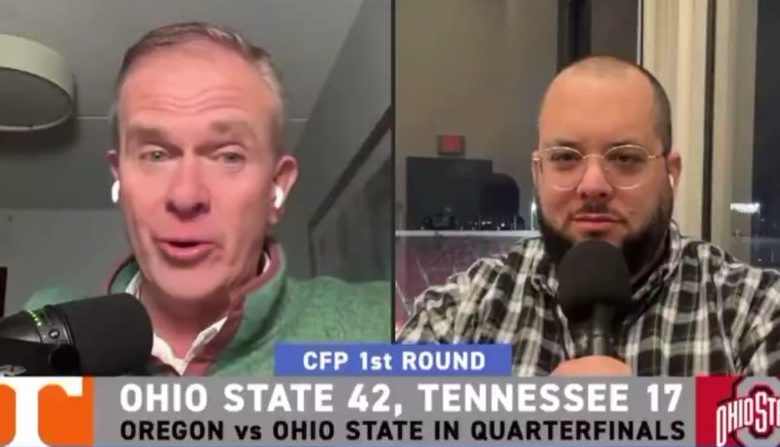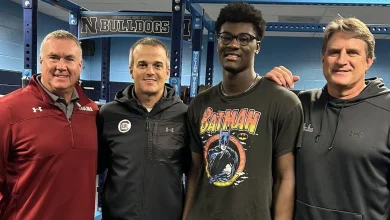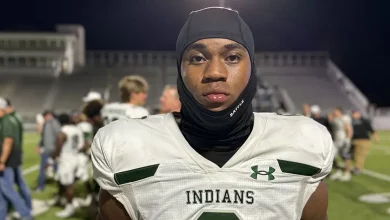Kirk Herbstreit defends the OSU coach when Ryan Day receives unimaginable murder threats, labeling the supporters a “lunatic fringe.”

In the world of college football, where passion runs deep and fanbases can be as unforgiving as they are supportive, coaches are often placed under intense scrutiny. The weight of expectations, especially at powerhouse programs like Ohio State, can be overwhelming. Coaches like Ryan Day, who have taken over major programs and steered them toward national prominence, are constantly under the microscope. While praise and accolades often come with the territory, so too do the harshest criticisms and, unfortunately, the most extreme forms of vitriol. For Day, the head coach of the Ohio State Buckeyes, this has been a reality in recent years, particularly after a string of disappointing losses in big games.
What was once a critical but relatively tame discourse over game strategies and recruiting has taken a dark turn. After a particularly difficult loss in the rivalry game against Michigan, a series of lackluster performances in crucial bowl games, and the constant pressure to win a national championship, Ryan Day began receiving unimaginable threats — including death threats. These messages of hate have taken a disturbing toll on the coach’s personal and professional life, and they reflect the worst elements of modern sports fandom.
In the face of these threats, one of Day’s biggest supporters and close friends in the world of college football, ESPN’s Kirk Herbstreit, stepped up to defend his colleague, calling out those who had crossed the line. Herbstreit didn’t mince words, condemning the actions of a “lunatic fringe” within Ohio State’s fanbase who had taken their criticisms of Day far beyond the realm of acceptable behavior.
The Weight of Being Ohio State’s Head Coach
Being the head coach at Ohio State is no small feat. The program has a rich history of success, filled with legendary names like Woody Hayes, Jim Tressel, and Urban Meyer. Expectations are high, and the Buckeyes are regularly among the favorites to compete for national championships. With this immense pressure comes the reality that no matter how good you are, someone will always find a reason to criticize, especially when it comes to high-stakes games like the annual rivalry against Michigan, the College Football Playoff, and the Big Ten Championship.
Ryan Day took over the Ohio State program in 2019, following Urban Meyer’s retirement. Meyer had led the Buckeyes to numerous Big Ten titles and a national championship in 2014, creating a legacy that Day had to both respect and surpass. In his first season, Day led Ohio State to a 13-1 record, reaching the College Football Playoff and falling short in a close semifinal game against Clemson. Despite the loss, Day had earned the respect of both fans and media for his offensive prowess, the team’s explosive playmaking, and the leadership he demonstrated in his first season.
However, in the years following, the pressure to perform — especially in the biggest moments — only grew. A series of high-profile losses, most notably to Michigan in 2021 and again in 2022, put Day under a magnifying glass. His ability to win big games, particularly against elite competition, became a central theme of critique. As the Buckeyes continued to fall short of the ultimate goal — a national championship — the calls for Day’s job began to grow louder. What had once been a promising tenure for the new head coach began to feel like a constant uphill battle against an increasingly impatient fanbase.
The situation took a darker turn after Ohio State’s disappointing 2022 season. The Buckeyes were eliminated in the College Football Playoff semifinals by Georgia in a heartbreaking game that went down to the wire, with a missed field goal in the final seconds sealing their fate. While Ohio State had shown immense promise throughout the season, this loss — combined with the earlier defeat to Michigan — led to a toxic atmosphere for Day. The constant pressure began to manifest in the most alarming ways: through death threats, harassment, and an overall disturbing level of animosity directed toward the coach.
The Disturbing Threats and the Dark Side of Fan Culture
The threats toward Ryan Day were not just limited to anonymous social media posts or verbal jabs; they escalated to the point where police were involved. Multiple reports surfaced of Day and his family being subjected to harassment, with individuals taking things far beyond sports rivalry. It was clear that a small faction of Ohio State supporters had allowed their frustrations to spiral into dangerous, irrational behavior.
These threats were a stark reminder of the increasingly toxic side of sports fandom, especially in college football. While passionate fanbases can be a source of great pride and energy for a program, they can also become breeding grounds for vitriol when things don’t go as planned. In a sport where the stakes are incredibly high, and every season feels like it could make or break a coach’s legacy, a growing number of people began to direct their anger at Day personally. The criticism, which was already heated, reached a boiling point, as a subset of fans — angered by Ohio State’s failure to win the big game — began to demand more than just Day’s firing; they sought revenge, even if it was only in the form of online threats.
For Ryan Day, these messages were not just a reflection of a few angry fans, but rather an example of the deep emotional and psychological toll that comes with being a head coach at one of the most storied programs in college football.
Kirk Herbstreit’s Response: Defending Day and Calling Out the “Lunatic Fringe”
Kirk Herbstreit, one of the most recognizable figures in college football and a long-time Ohio State supporter, could no longer stand by quietly as his friend Ryan Day became the target of such horrific treatment. Herbstreit, who played quarterback for the Buckeyes in the early 1990s, has built a reputation as an outspoken advocate for the sport, known for his honest assessments, deep knowledge, and personal connections within the game. His defense of Day was not just about sports, but about human decency.
In an emotional response during one of his appearances on ESPN’s “College GameDay,” Herbstreit addressed the death threats and harassment aimed at Day. He didn’t just criticize the individuals responsible for the threats — he condemned the entire mindset that allowed such behavior to flourish within Ohio State’s fanbase.
“There’s a lunatic fringe out there, and it’s not just in Ohio State’s fanbase. It’s everywhere,” Herbstreit said. “But when you start sending threats to someone’s life over a game, something has gone terribly wrong. These are human beings we’re talking about — coaches, players, staff — they’re not just pawns on a chessboard. They give everything they have to this program, and for some fans to take that and turn it into hate, that’s just not okay.”
Herbstreit went on to speak about his personal relationship with Ryan Day, describing him as someone who “lives and breathes Ohio State football” and who has always carried himself with professionalism, integrity, and respect for the game. He made it clear that the Buckeyes’ head coach had been nothing but committed to the program and had been working tirelessly to bring a national championship back to Columbus.
The ESPN analyst called on fans to remember the bigger picture: while sports can bring out extreme emotions and opinions, it is essential to keep things in perspective. He acknowledged the high expectations that come with being the head coach at Ohio State but reminded the public that the vitriol toward Day went well beyond the realm of fair criticism.
Herbstreit also drew attention to the societal issues surrounding the nature of online interactions. He spoke about how social media has allowed people to express their anger and frustrations without accountability, something that had amplified the voices of those with extreme viewpoints. The internet, he argued, was a double-edged sword — offering unprecedented access to athletes and coaches, but also providing a platform for harmful behavior and threats.
“I’ve never seen it this bad,” Herbstreit continued. “There’s a fine line between passionate criticism and crossing the line into unacceptable behavior. Some of the things Ryan Day has been subjected to should never happen to anyone, let alone someone who dedicates his life to a program. It’s time for people to take a step back and realize that this is not just about football. This is about people’s lives.”
The Impact of Herbstreit’s Words: A Call for Unity and Reflection
Herbstreit’s defense of Ryan Day was a powerful moment of solidarity, and it reverberated across college football. His words resonated not only with Ohio State fans but with anyone who had witnessed the rise of toxic fan culture in recent years. While sports fans are known for their fierce loyalty and passionate opinions, Herbstreit reminded everyone that there is a boundary between healthy fandom and destructive behavior.
For Ryan Day, the support from his friend and colleague provided much-needed solace in an incredibly challenging time. While the threats against him were still real and concerning, knowing that he had the backing of a respected figure like Herbstreit and a wide network of colleagues and fans gave him strength.
Herbstreit’s call for unity was particularly poignant. It was not just a call to support Day, but a plea for people to remember that sports are meant to bring communities together — not tear them apart. The true spirit of college football, he argued, lies in the celebration of the game, the athletes, and the coaching staff who dedicate their lives to making their programs successful.
The Need for Accountability and Compassion in Sports
Kirk Herbstreit’s defense of Ryan Day was a testament to the power of compassion, loyalty, and integrity in an often ruthless world of college football. In a landscape where fan passion sometimes blurs the line between enthusiasm and hostility, Herbstreit’s response was a much-needed reminder of the humanity behind the coaches and players who make the game what it is.
While Ryan Day will undoubtedly continue to face immense pressure as the head coach of Ohio State, the support from figures like Herbstreit and the broader college









